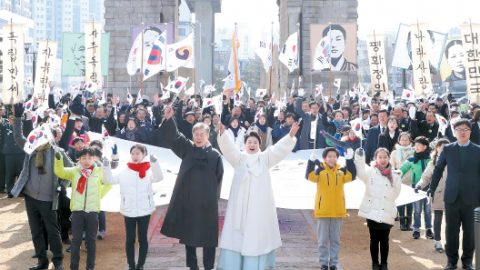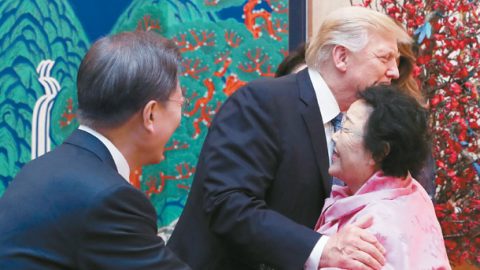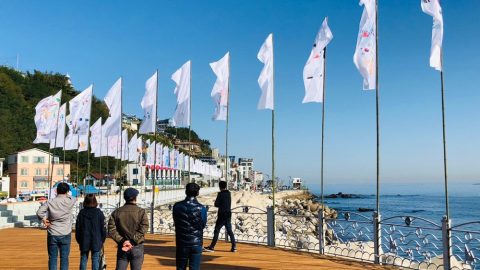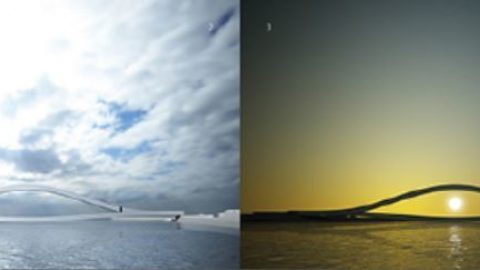2011-08-22
There is still time before the international community comes to any consensus on the official appellation for the body of water Korea’s neighbor Japan calls the Sea of Japan and Korea calls the East Sea, Seoul officials said.
That is because amid all the wrangling between Korea and Japan over what to call the East Sea and their colorful rhetorical flourishes, an international consultative body on nautical charts and other maritime issues is plodding methodically along, building consensus toward an accepted name for the body of water shared by the two nations, as well as North Korea and Russia.
In a sign of hope for Korea, a significant number of countries at the International Hydrographic Organization (IHO) expressed disapproval for Japan’s push to name the body of water it shares with Korea the Sea of Japan only, a Foreign Affairs and Trade Ministry official said earlier this month.
More opposed to Sea of Japan
More than half of the IHO’s working group on the standardization of geographical names rejected a proposal to name the 978,000-square-kilometer area the Sea of Japan, the official said.
The working group is made up of experts from 27 of the intergovernmental consultative organization’s 80 member countries.
The chairman of the IHO working group recently asked its 27 members, including the United States and China, to give their opinion on a compromise deal, which would name it the Sea of Japan and use the East Sea as an alternative name in the appendix,� another government official said.
In this regard, we have confirmed that slightly more than half of them expressed their disapproval for the proposal.� She noted that China has also indirectly expressed its displeasure with the suggestion, saying the decision should be reached through a consensus.�
Government officials said France and Australia have expressed strong support for Korea’s demand to use both the East Sea and Sea of Japan to refer to the body of water.
The working group at the IHO will deliberate and report to the body’s 18th General Assembly, currently slated for April next year.
The IHO is now asking for the opinions as it prepares the fourth revision to its Limits of Oceans and Seas, a standard reference in map production worldwide.
The Sea of Japan was adopted as the standardized name at the International Hydrographic Conference in 1929, during Japan’s colonial rule over Korea. Seoul officially objected to the appellation at the U.N. Conference of Standardization of Geographical Names held in New York in 1992 � at its first opportunity since it formally joined the U.N. a year earlier, and then again 1998.
If most of the members of the working group support Sea of Japan,� the name could end up being chosen at next year’s meeting.
If a clear majority, however, fails to take a position on a name or supports a dual appellation for the body of water, then all that might change.
The IHO, which was launched in 1921, has issued three revisions to Limits of Oceans and Seas,� in 1929, 1937 and, its current third revision, in 1953. Sea of Japan� was chosen due to intense lobbying by Japan after it colonized Korea.
Foreign Affairs and Trade Minister Kim Sung-hwan told reporters during a regular briefing earlier this month that Seoul’s ultimate aim is to persuade the international community to refer to the body of water as the East Sea.
The government has been pushing for the parallel use of the East Sea and Sea of Japan since its joining the United Nations (in 1991), but that is not our final goal,� he said. ur ultimate aim is the singular use of the East Sea,he said.
Bitter colonial legacy
The foreign minister underlined that the appellation Sea of Japan is a legacy of Tokyo’s brutal 35-year colonial rule over the Korean Peninsula, which ended in 1945 upon its defeat in World War II.
Seoul maintains that the IHO should use its preferred name, the East Sea, together with the Sea of Japan as the former has been used by Koreans for the past 2,000 years, far longer than the Sea of Japan.
Japan is believed to have begun to refer to the disputed area as the Sea of Japan in the late 18th century.
It has been the dominant appellation for the waters in the past century as it was commonly adopted by cartographers during the Japanese colonial rule of Korea.
The government maintains it is nonsensical to name a sea surrounded by four countries after only one of them.
Some experts have said that is common to name the body of water after the land on the left side of the sea, which in this case would be Korea, or the Sea of Korea.
On Tokyo’s renewed claims to the South Korean islets of Dokdo, in the East Sea, the government has been adamant their ownership is not up for debate.
In an effort at Dokdo one-upmanship, Tokyo is considering taking the issue over the barren islets to the International Court of Justice (ICJ).
Source : THE KOREA TIMES
http://www.koreatimes.co.kr/www/news/nation/2011/08/113_93293.html




